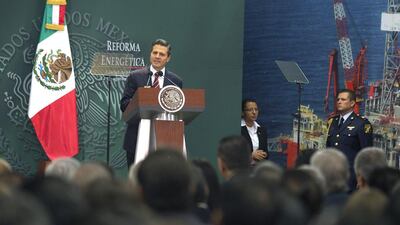In a sign of deepening commercial and diplomatic ties, Mexico and the UAE expect to sign at least two major energy deals to coincide with the mid-December state visit by Enrique Peña Nieto, the first-ever visit to the UAE by a Mexican president.
Mexico, which passed laws this month clearing the way for direct foreign investment in its oil sector for the first time since nationalisation in 1938, is keen to court international investment and technical expertise as it seeks to attract up to US$50 billion to the sector over the next five years to explore and develop new resources.
The country's oil production – which provides about a third of state revenue – has been declining, as the country lacks expertise to optimise existing fields and to find new deposits in hard-to-access areas.
Mexico is at the advanced stages of a memorandum of understanding with Mubadala Petroleum and is working on one with Abu Dhabi National Oil Company, according to Mexico's ambassador to the UAE, Francisco Alonso. He said that apart from energy, Mexico has also targeted infrastructure – DP World executives have been in talks with Mexican companies and its chairman has said the company plans to expand in Latin America. Mexico also hopes to finalise a deal to open up routes for Abu Dhabi's Etihad Airways.
On the energy front, Mexico’s state oil company, Petróleos Mexicanos (Pemex), will make a number of presentations to companies in the UAE over the next couple of months. In the middle of next month, José Manuel Carrera Panizzo, the head of Pemex’s international arm, PMI, will hold high-level talks in Abu Dhabi about distribution deals for Pemex oil products.
Pemex will have a large presence at the Abu Dhabi International Petroleum Exhibition and Conference in mid-November for the first time, with the aim of explaining the new reforms and opportunities to oil executives.
Mexico has targeted the Arabian Gulf in general and the UAE in particular as a source of growth for trade and investment, Mr Alonso said. Since the opening of Mexico’s embassy in Abu Dhabi in 2008, foreign minister-level visits have increased substantially, and in December Mr Nieto is spending a day in each of the GCC state capitals, but will finish up with two days in the UAE, a diplomatic signal of the country’s importance.
“The UAE is the perfect business partner for Mexico because of some shared experiences and philosophies and the ease of doing business here,” Mr Alonso said. Apart from investment, the energy deals will look to share technical expertise in offshore and unconventional exploration and production. Also, Mr Alonso added, Mexico looks to the UAE for its experience in formulating contracts with international oil companies and for managing its oil revenues.
Mexico’s potential to develop its oil sector is substantial, but so are its challenges. This week the United States energy information agency said that the reforms could lead to “profound” improvement for Mexico’s oil sector. In last year’s outlook, the EIA projected Mexico’s oil output would continue to decline from 3 million barrels per day in 2010 to 1.8 million bpd in 2025 and then struggle to stay at 2 million bpd through 2040. But the EIA said its forthcoming outlook would project output stabilising at 2.9 million bpd through 2020 and rising to 3.7 million bpd by 2040 – about 75 per cent higher than its previous outlook.
However, that is contingent on success with the reforms, and the EIA added: “There are many complexities to the new reforms and many details that still must be settled before the reforms can take effect.”
It is not yet clear whether Pemex has the institutional capacity to make the reforms work. Last month a report on reforming national oil companies by the National Resource Governance Institute, an advocacy group, rated Pemex low for “achievement of government technical/economic goals”, citing its lack of technical competence as well as its fuzzy mandate, which includes doling out money for social programmes.
The report had Norway as its gold standard for national oil company and use of funds, and Mr Alonso acknowledged this, saying: “Norway is the model we are looking for”. But Mexico will have to deliver considerable reform before that goal is reached.
amcauley@thenational.ae
Follow The National's Business section on Twitter

